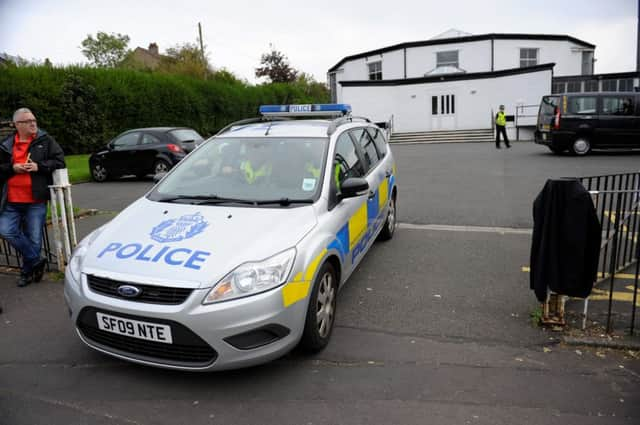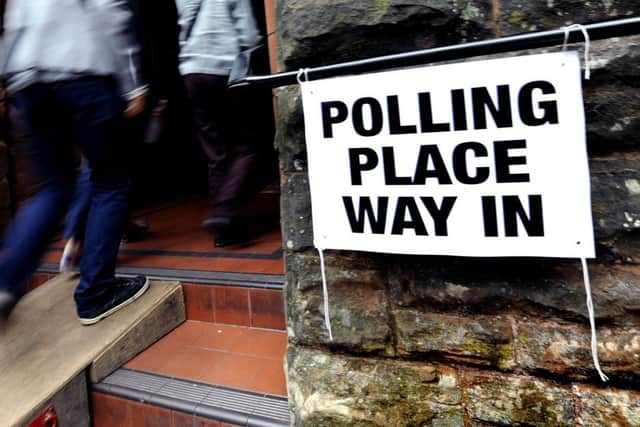Scottish independence: polling day arrests made


Marie Rimmer, a former council leader was arrested after an incident at Shettleston Community Centre as emotions ran high across the country.
A man was also arrested outside a polling place in Faifley Road, Clydebank and politicians took to Twitter to slam Yes supporters who daubed intimidating slogans on walls as voters prepared to enter the booths.
Advertisement
Hide AdAdvertisement
Hide AdA spokeswoman for Police Scotland confirmed Ms Rimmer’s arrest, she said: “We can confirm a 67-year-old woman has been arrested and charged in connection with an alleged assault on a female following an incident at Shettleston Community Centre in Amulree Street, Glasgow around 1300 hrs today.


“A report will be submitted to the Procurator Fiscal.”
Police also confirmed that a 44-year-old man had been arrested outside a polling place in Clydebank around 8.30am this morning.
Labour MSP, Keiza Dugdale tweeted: “Twitter Help: If u see anyone taking #nothanks A boards away from polling stations – take a pic/note reg plate. Police have been notified.”
Another tweet from Labour’s West Dunbartonshire MP Gemma Doyle referred to graffiti scrolled on a wall with the slogan - “Vote Yes or Else” she said: “Horrible intimidation on a polling station in the Vale. Scotland deserves better than this.”
Slogan
The slogan was spray-painted outside Jamestown Parish church in Alexandria and photographed by local MSP Jackie Baillie, who then tweeted: “Shocking behaviour from yes campaigners. Should not be trying to threaten and intimidate.”
The vandalism was later painted over but Reverend Norma Moore, 62, minister of Jamestown Parish Church, said: “In my opinion it is just crass and appalling for someone to do that. I think it’s just really ignorant.
“I’m pretty sure that most people will think that it doesn’t help the debate at all, and if anybody thinks that’s a way to win a vote then is that really the kind of Scotland you would want to live in?”
Advertisement
Hide AdAdvertisement
Hide AdOne woman who voted No, and asked to remain anonymous, said: “I think most people are taking it as a silly joke from kids as there’s not been anybody around the polling station trying to intimidate voters, but if it is real, well it’s not something you want to see and know it’s actually serious.”
Emma Kinloch tweeted a picture of graffiti dubbed on a wall that read - “Freedom Vote Yes No Voters Will Be Shot.”
Labour MP for Inverclyde, Iain McKenzie, was caught up in a Twitter spat with Yes campaigners who said he had been ejected from a polling station for shouting at voters.
He tweeted: “More lies from Yes Scotland supports [sic] on twitter accusing me of shouting at voters in Port Glasgow. Absolutely No truth in this whatsoever!”
Meanwhile, the impact of social media on the referendum campaign has been discussed by academics.
Dr Mark Shephard, of Strathclyde University, has researched social media and the independence referendum.
“We know from other elections - like the Irish presidential election in 2011 - that social media can have the power to agenda-set at core times,” he said.
Advertisement
Hide AdAdvertisement
Hide Ad“Someone might post something that gains traction and people then start believing that, or it might undermine a campaign.”
With almost half of adults in the UK using social networking sites on a regular basis, according to official statistics, its use by political parties and campaigns has never been more critical.
Dr Shephard’s research, has involved tracking Facebook and Twitter accounts on both sides of the debate since August 2013, and he found the Yes camp were more active. It measured a range of indicators such as Facebook likes, Twitter follower count and tweets from each campaign.